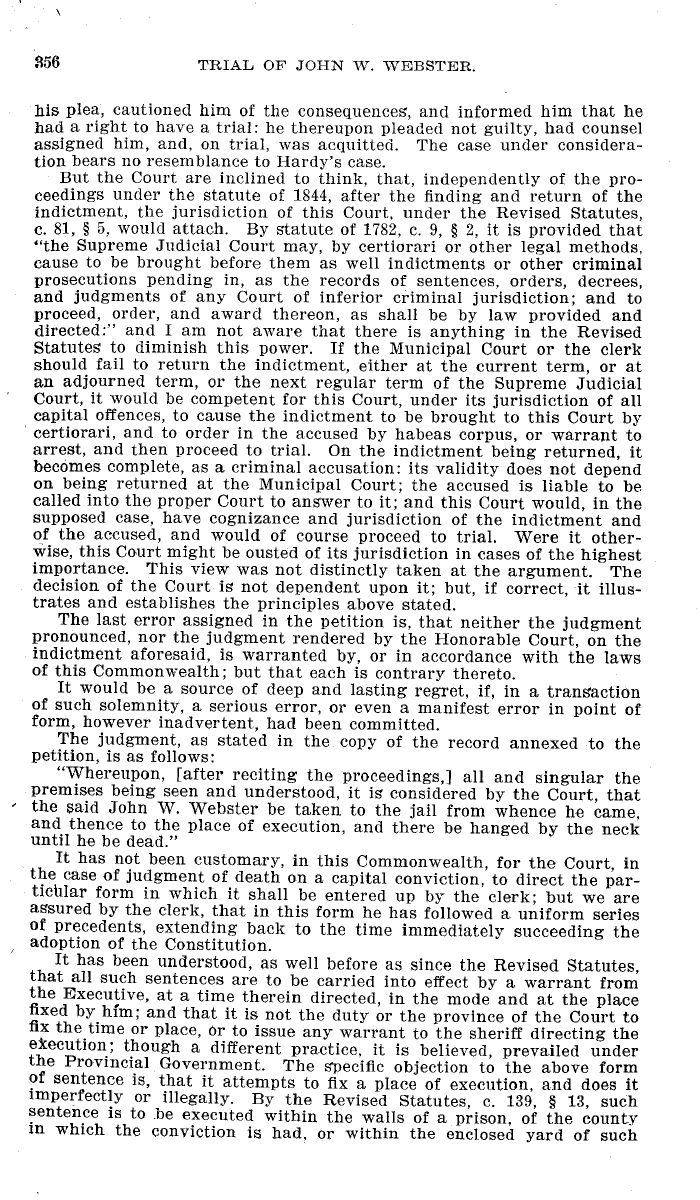|
R56 TRIAL OF JOHN W. WEBSTER.
his plea, cautioned him of the consequences, and informed him that he
had a right to have a trial: he thereupon pleaded not guilty, had counsel
assigned him, and, on trial, was acquitted. The case under considera-
tion bears no resemblance to Hardy's case.
But the Court are inclined to think, that, independently of the pro-
ceedings under the statute of 1844, after the finding and return of the
indictment, the jurisdiction of this Court, under the Revised Statutes,
c. 81, § 5, would attach. By statute of 1782, c. 9, § 2, it is provided that
"the Supreme Judicial Court may, by certiorari or other legal methods,
cause to be brought before them as well indictments or other criminal
prosecutions pending in, as the records of sentences, orders, decrees,
and judgments of any Court of inferior criminal jurisdiction; and to
proceed, order, and award thereon, as shall be by law provided and
directed:" and I am not aware that there is anything in the Revised
Statutes to diminish this power. If the Municipal Court or the clerk
should fail to return the indictment, either at the current term, or at
an adjourned term, or the next regular term of the Supreme Judicial
Court, it would be competent for this Court, under its jurisdiction of all
capital offences, to cause the indictment to be brought to this Court by
certiorari, and to order in the accused by habeas corpus, or warrant to
arrest, and then proceed to trial. On the indictment being returned, it
becomes complete, as a criminal accusation: its validity does not depend
on being returned at the Municipal Court; the accused is liable to be
called into the proper Court to answer to it; and this Court would, in the
supposed case, have cognizance and jurisdiction of the indictment and
of the accused, and would of course proceed to trial. Were it other-
wise, this Court might be ousted of its jurisdiction in cases of the highest
importance. This view was not distinctly taken at the argument. The
decision of the Court is not dependent upon it; but, if correct, it illus-
trates and establishes the principles above stated.
The last error assigned in the petition is, that neither the judgment
pronounced, nor the judgment rendered by the Honorable Court on the
indictment aforesaid, is warranted by, or in accordance with the laws
of this Commonwealth; but that each is contrary thereto.
It would be a source of deep and lasting regret, if, in a transaction
of such solemnity, a serious error, or even a manifest error in point of
form, however inadvertent, had been committed.
The judgment, as stated in the copy of the record annexed to the
petition, is as follows:
"Whereupon, [after reciting the proceedings,] all and singular the
premises being seen and understood, it is considered by the Court, that
the said John W. Webster be taken to the jail from whence he came,
and thence to the place of execution, and there be hanged by the neck
until he be dead."
It has not been customary, in this Commonwealth, for the Court, in
the case of judgment of death on a capital conviction, to direct the par-
ticular form in which it shall be entered up by the clerk; but we are
assured by the clerk, that in this form he has followed a uniform series
of precedents, extending back to the time immediately succeeding the
adoption of the Constitution.
It has been understood, as well before as since the Revised Statutes,
that all such sentences are to be carried into effect by a warrant from
the Executive, at a time therein directed, in the mode and at the place
fixed by hfm; and that it is not the duty or the province of the Court to
fix the time or place, or to issue any warrant to the sheriff directing the
ekecution; though a different practice, it is believed, prevailed under
the Provincial Government. The specific objection to the above form
of sentence is, that it attempts to fix a place of execution, and does it
imperfectly or illegally. By the Revised Statutes, c. 139, § 13, such
sentence is to .be executed within the walls of a prison, of the county
in which the conviction is had, or within the enclosed yard of such
|

